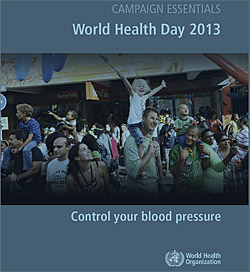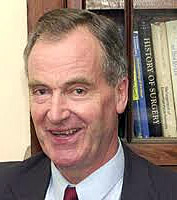World Health Day is World Health Organisation’s birthday. It is celebrated on 7 April to mark the anniversary of the founding of WHO in 1948. Each year a theme is selected highlighting a priority area of public health concern in the world.
 The theme for World Health Day 2013 is controlling high blood pressure, a condition which affects more than one in three adults worldwide. For millions of people, high blood pressure will lead to fatal heart attacks, debilitating strokes, and chronic heart and kidney disease.
The theme for World Health Day 2013 is controlling high blood pressure, a condition which affects more than one in three adults worldwide. For millions of people, high blood pressure will lead to fatal heart attacks, debilitating strokes, and chronic heart and kidney disease.
The CWU is supporting this very important campaign, and therefore Dave Joyce, CWU’s National Health, Safety & Environment Officer has issued a letter to all CWU branches (LTB210/13) detailing the campaign and providing information and links to the campaign, along with information regarding a leading UK charity, Blood Pressure UK, which provides information packs, advice and details of activities supporting those who wish to embark upon their own health surveillance in the form of blood pressure monitoring.
In the LTB Dave reminds us of the fact that:
 "High blood pressure is the biggest known cause of disability and premature death in the UK through stroke, heart attack and heart disease. One in three adults in the UK has high blood pressure and every day 350 people have a preventable stroke or heart attack caused by the condition."
"High blood pressure is the biggest known cause of disability and premature death in the UK through stroke, heart attack and heart disease. One in three adults in the UK has high blood pressure and every day 350 people have a preventable stroke or heart attack caused by the condition."
Dave includes in his LTB, two Information Leaflets from the Blood Pressure Association (Blood Pressure UK):
· Introducing high blood pressure
· High blood pressure: A practical guide from the Blood
Both of these documents can be downloaded from this website's E-Library Database
In highlighting this major health issue, the World Health Organisation says:
‘As the world’s population ages and grows, unhealthy behaviours – an unbalanced diet, a lack of physical activity, smoking, harmful use of alcohol – together with stressful lifestyles, all increase the chances of developing high blood pressure. All regions of the world are affected.
High blood pressure is both preventable and treatable. Increasing public awareness is key, as is access to early detection. Countries need systems and services in place to support healthy lifestyles. Access to medicines of good quality, which are effective and inexpensive, is also vital, particularly at primary care level.
This year’s campaign provides an opportunity to focus attention on the prevention and control of high blood pressure, as a means of reducing the number of people affected, both now and in the future, by cardiovascular disease.’
But just what is meant by the term ‘Blood Pressure’ and what is high blood pressure?
 WHO explain:
WHO explain:
* Blood pressure is the force of blood against the inside of blood vessels. It is created by the pumping of the heart.
* Blood pressure is measured in millimetres of mercury (mm Hg) and is recorded as two numbers usually written one above the other.
* The upper number is the systolic blood pressure, the highest pressure in blood vessels when the heartbeats. The lower number is the diastolic blood pressure, the lowest pressure in blood vessels in between heartbeats when the heart relaxes.
* Normal adult blood pressure is defined as a systolic blood pressure of 120 mm Hg and a diastolic blood pressure of 80 mm Hg. (Some physicians express this as “12 over 8”, rather than “120 over 80”.)
* Normal levels of both systolic and diastolic blood pressure are particularly important for the efficient function of vital organs, such as the heart, brain and kidney, and for overall health and wellbeing.
In order for people to be able to embark upon the campaign on 7th April, the organisation has produced a ‘Campaign Essentials’ information pack which provides clarification as to what blood pressure is, how it is measured; and gives some alarming statistics in terms of death rates from high blood pressure around the world.
The WHO explains the campaign objectives as being:
- to raise awareness of the causes and consequences of high blood pressure;
- to provide information on how to prevent high blood pressure and related complications;
- to encourage adults to check their blood pressure and to follow the advice of healthcare professionals;
- to encourage self-care to prevent high blood pressure;
- to make blood pressure measurement affordable to all;
- to incite national and local authorities to create enabling environments for healthy behaviours.
The risk of developing high blood pressure can be reduced by:
- reducing salt intake;
- eating a balanced diet;
- avoiding harmful use of alcohol;
- taking regular physical activity;
- maintaining a healthy body weight; and
- avoiding tobacco use.
The World Health Organisation, through this campaign, encourages individuals and organisations working at international, regional, national, and community levels, in the public and private sectors and civil society, to coordinate and engage in activities for World Health Day.
Meanwhile, the UK's leading charity, Blood Pressure Association, through its website Blood Pressure UK; provides information relevant specifically to this country and highlights the UK's 'Know Your Numbers Week' which aims to get people to have their blood pressure checked. People are able to utilise any of the over 1,500 free blood pressure testing stations set up all over the UK to encourage and enable people to get that potentially life saving free blood pressure check.
Professor Graham MacGregor, Chair of Blood Pressure UK, says in a press release:
 “High blood pressure is a very dangerous condition when not managed. Its effects can ruin lives, take lives and destroy families. It’s not just old people who have high blood pressure. Even in your thirties, you have a thirty percent chance of having raised blood pressure. It is the biggest cause of strokes and heart attacks, but the good news is that it can be lowered through lifestyle changes and if needed by medication.
“High blood pressure is a very dangerous condition when not managed. Its effects can ruin lives, take lives and destroy families. It’s not just old people who have high blood pressure. Even in your thirties, you have a thirty percent chance of having raised blood pressure. It is the biggest cause of strokes and heart attacks, but the good news is that it can be lowered through lifestyle changes and if needed by medication.
The most single important thing that you need to know is what your blood pressure is. You won’t know what your blood pressure is, the only way you can find out is by going for a free check today."
He concludes by saying:
“It is everyone’s responsibility to take care of their health for their own sake and their family’s. Watching what you eat and drink and knowing your blood pressure and weight is common sense.
Please take advantage of the free blood pressure checks on offer to lower yours and their risk of stroke and heart attack."
You can download the WHO ‘Campaign Essentials’ document by clicking on the associated pic above, or by searching the E-Library Database and selecting search category: 'Cardiac Health'.
Download the two information leaflets provided in LTB210/13 from the E-Library Database here
Access further information about High Blood Pressure provided by the Blood Pressure Association here
Source: World Health Organisation / CWU / Blood Pressure UK / Unionsafety


 The theme for World Health Day 2013 is controlling high blood pressure, a condition which affects more than one in three adults worldwide. For millions of people, high blood pressure will lead to fatal heart attacks, debilitating strokes, and chronic heart and kidney disease.
The theme for World Health Day 2013 is controlling high blood pressure, a condition which affects more than one in three adults worldwide. For millions of people, high blood pressure will lead to fatal heart attacks, debilitating strokes, and chronic heart and kidney disease. "High blood pressure is the biggest known cause of disability and premature death in the UK through stroke, heart attack and heart disease. One in three adults in the UK has high blood pressure and every day 350 people have a preventable stroke or heart attack caused by the condition."
"High blood pressure is the biggest known cause of disability and premature death in the UK through stroke, heart attack and heart disease. One in three adults in the UK has high blood pressure and every day 350 people have a preventable stroke or heart attack caused by the condition."
 “High blood pressure is a very dangerous condition when not managed. Its effects can ruin lives, take lives and destroy families. It’s not just old people who have high blood pressure. Even in your thirties, you have a thirty percent chance of having raised blood pressure. It is the biggest cause of strokes and heart attacks, but the good news is that it can be lowered through lifestyle changes and if needed by medication.
“High blood pressure is a very dangerous condition when not managed. Its effects can ruin lives, take lives and destroy families. It’s not just old people who have high blood pressure. Even in your thirties, you have a thirty percent chance of having raised blood pressure. It is the biggest cause of strokes and heart attacks, but the good news is that it can be lowered through lifestyle changes and if needed by medication.